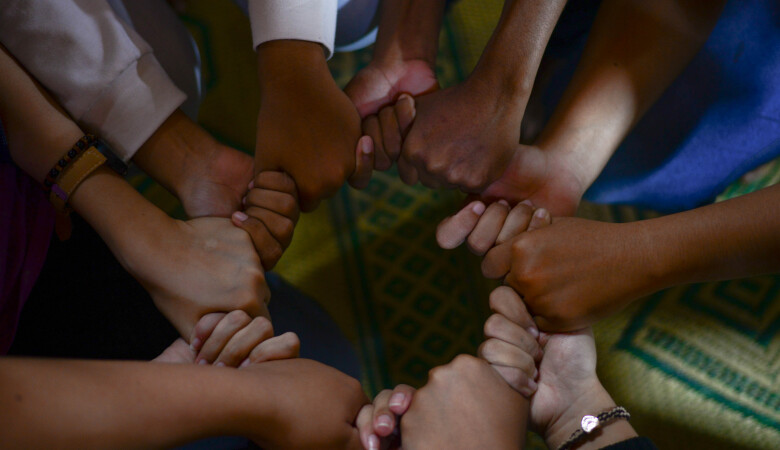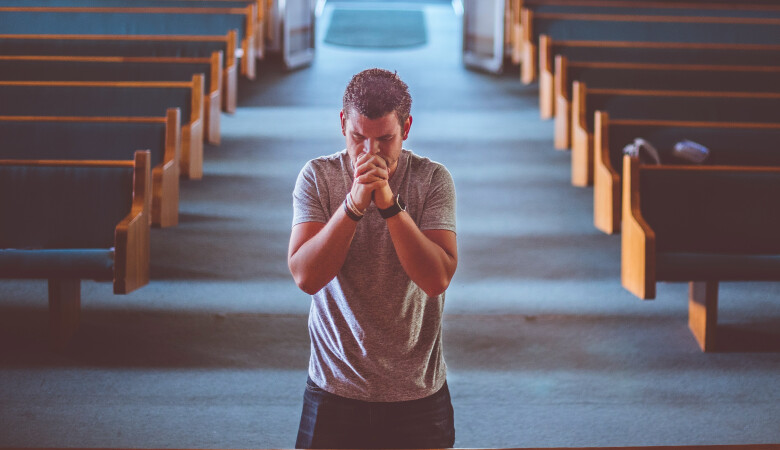The Christian Family Watches Over One Another in Love (Galatians Sermon 23 of 26)
June 08, 2014 | Andy Davis
Galatians 6:1-6
Brotherly Love, Church Membership
Pastor Andy Davis preaches on Galatians 6:1-6, and the responsibility of family members to watch over one another.
- SERMON TRANSCRIPT -
It's amazing to me that less than three centuries after an obscure Jewish man, Jesus of Nazareth, was tried and convicted, and sentenced to death in Judea, which was a remote outpost of the Roman Empire… Just less than three centuries after that, the Roman Emperor himself declared himself to be a Christian. He said that he believed that, that Jewish man was actually the Son of God. I’m talking, of course, about the Emperor Constantine. Now, three centuries may seem like a long time, but things moved very slowly back then. The Roman Empire was in charge of the world, of that part of the world for almost 1,000 years, so things moved very, very slowly, not lightning quickly like they do in our age. And so that's a very short amount of time.
How did it happen? How did the Kingdom of Jesus Christ advance and conquer? Spiritually conquer now, not with the sword like Islam did, sweeping across North Africa with the sword. No, but rather with the truth of the Gospel. How did Christ win? How did the Gospel advance so rapidly in such a short amount of time? Well, there's a lot of answers to that question, it's complex. But there are two factors, in particular, that come to my mind, both of them having to do with the nature of the church in the world. The first was the incredible, the supernatural courage that Christians had in facing death. They weren't afraid at all of death. They were willing to die for their faith. They died cheerfully and courageously with great boldness, and nothing could stop them. And so "the blood of martyrs was seed for the church," Tertullian told us.
But a second great apologetic and proof of the truth of Christianity was love, the way that the Christian community loved one another. Now, about 125 years after Christ, the Emperor Hadrian was trying to figure out this growing, spreading phenomenon of Christianity. And he sent a spy, Aristides, to find out who these Christians were, and what they were doing. And this one came back with an interesting, and mixed report. But one of the things he said is, "Behold how they love one another." Maybe 50 to 75 years later, the same Tertullian picked up on that and said, "This is the very thing the pagans are saying about us, ' Behold how they love one another.' "
This love that Christians have, this supernatural self-sacrificial love, was the very way that Christ said that the watching world would be able to identify us as His disciples. As it says in John 13:35, "By this will all men know that you are my disciples, if you love one another." We are and we must be a community of love, of brotherly love. And we must put that love on display. And the verses that we've heard this morning give us some tremendous insights on some ways we can do that. It's not comprehensive, but there's a lot in these verses that teach us how the Christian church is to love one another.
Now, we have in our church covenant, you hear it every time we have New Members Sunday, a statement that I've pondered much this past week. And that is the statement, "We will watch over one another in brotherly love." We promised to do that for each other. We promised. We covenant together to watch over one another in brotherly love. Now, if you were to come to me and say, "Okay, in our church covenant, do you think that these things are coming from Scripture?" I would say, "Every one of them." Every statement in our church covenant, I think has a scriptural basis, alright? On that particular one, "We will watch over one another in brotherly love," what Scripture would you say supports that? I would say there's many. But of all the verses I could pick, I would bring you immediately to Galatians 6:1. I think that Galatians 6:1 is the best scriptural support for the promise that we have made to one another, that we will watch over one another in brotherly love.
I. The Christian Family Restores Those Caught In Sin (verse 1)
We are a Christian family, and one thing that the Christian family does is, we restore those that are caught in sin. Look at verse 1, it says, "Brothers, if someone is caught in a sin, you who are spiritual should restore him gently. But watch yourself or you also may be tempted." So here we come to what I would call an expected emergency in the life of the church, an expected emergency. Someone in the church is caught in a sin. It's expected because we, all of us, struggle with the flesh, as we've just been talking about in Galatians 5. We are deeply divided and we struggle. And from time to time, there's going to be some outbreaks, and we are going to be, from time to time, caught in a sin.
"We are a Christian family, and one thing that the Christian family does is, we restore those that are caught in sin. "
The idea here from the original language, is something of being captured or seized like a prisoner of war, surprised like a traveler who is caught by some highway bandits. But it's not entirely that way, because it's a sin, so the individual is complicit in it. The individual has yielded in some ways, defiled by this. But there's a sense of what the Puritans call the 'surprisal.' It comes on you, and you're captured, or caught in a sin. Well, it's time... It's an emergency, because it's time for the church to be mobilized. The world doesn't care about this at all unless it's a crime, then they'll mobilize the police or the FBI. But if it's not a crime, doesn't care, actually might even celebrate it. But the church cares very much. And so we are mobilized when one of the brothers or sisters is caught in a sin, it's a sin issue.
Perhaps the adulterous relationship has been exposed. Perhaps the internet pornography use has been revealed. Perhaps the gossip has gone just a bit too far at last, and someone's been really hurt by it. Perhaps the bitterly critical wife has disrespected her husband or the harsh husband has been exposed in public. Perhaps the one cheating on his taxes has been caught by an IRS audit. Maybe the college student's been caught cheating or plagiarizing in some way. Someone's been caught in a sin, and it's time for the church to do what it alone can do, to reach out in love, and restore the sinner.
Now, it might be something that's just a matter of spiritual drift, as it says in Hebrews, "We must pay more careful attention, therefore, to what we have heard, so that we do not drift away." That can be the same kind of sense here. Someone is drifting away from Christ and they're caught in like an undertow, they're drawn away because of this pattern of sin. And the centerpiece of this passage is the restoration of the sinner to spiritual health by humble, gentle, persistent, loving brothers and sisters in Christ. It's part of a healthy church family that's depicted here so powerfully.
Now, let's understand, again, our context, the Galatian legalism Paul is seeking to overwhelm by grace, the grace of the Gospel, to drive away the legalistic view of the Gospel that these Judaizers, these false teachers had been teaching, that salvation, justification is a combination of faith in Christ plus the law of Moses, obedience to the law. And Paul is writing to say this false gospel is no Gospel at all, it's not true, and so he's written this whole Book of Galatians. Now, wherever there's legalism, there's always, at the root of it, spiritual pride. It flows from and increases spiritual pride. It results in an attitude of, "Here's the standard, now it's up to you to meet it. We all do, what's wrong with you?" So there's that attitude, that legalistic attitude of pride. If you're meeting the standard, you're superior, morally superior to those that don't meet it.
Just like Jesus said to the Scribes and Pharisees in Matthew 23, Verse Four, "Woe to you Scribes and Pharisees, you hypocrites! You tie up heavy loads and put them on men's shoulders, but you yourselves are not willing to lift a finger to move them." So here's this terrible burden being put on people, the legalistic burden, and they're just saying, "Hey, here's the standard, you have to live up to it." Now, Paul hinted at the divisiveness and internal warfare that such a legalistic preaching of the Gospel produces. If you look back at Galatians 5:15, there Paul says, "If you keep on biting and devouring each other, watch out or you'll be destroyed by each other." That's a legalistic, harsh, accusing community, very unpleasant to be around. The remedy to this kind of legalism, of course, is the Gospel of Jesus Christ, including the grace for forgiveness, the grace of justification, along with the gift of the indwelling Holy Spirit to combat sin.
The Spirit-filled life in the church is an infinitely superior way to live in community with each other. We have the beautiful description of the Fruit of the Spirit that we've had described, which I just think is the most beautiful way to live. I just commend it to you, even though I'm not preaching on it. If I'm not careful, I'll slip right back and preach the Fruit of the Spirit again. You should meditate on that list, memorize it, just flash at every moment, "Am I characterized, right now, by the Fruit of the Spirit? Is this me right now? And if not, I must repent." And so this is just a tremendous community of love that we should be displaying by the Power of the Spirit. Then in Verse 25-26, at the end of Galatians 6, he says, "Since we live by the Spirit, let us keep in step with the Spirit. Let us not become conceited, provoking and envying each other." So there's that pride, that spiritual arrogance. It results in a self-destructive church, people who are conceited, who provoke each other by spiritual competitiveness, and judgmentalism, and that legalism, or who envy one another, rather than working together to conquer our mutual adversary, which is sin.
So we're at war, all of us, and we talked about that in Galatians 5. We're at war, but our struggle 's not against flesh and blood, but our struggle is against the world, the flesh, and the devil, that indwelling sin, and the devil, and the world. We are at war. And we are called on to be together in that. We're called on to use that famous phrase from Shakespeare "to be a band of brothers." You remember in Henry V, where Shakespeare put these words into King Henry's mouth, as he's gathering the men together for a critical battle? And he talks about that band of brothers, he says, "We few, we happy few, we band of brothers. For he today that sheds his blood with me shall be my brother, be he ne'er so vile." Stephen Ambrose, the historian, talked about how being in battle together forms a cohesiveness, almost a family sense within a unit, and they become a band of brothers together. And so must it be in the Christian church.
We're at war, but not with each other. We're at war with sin. And we need to fight, we need to fight our common enemies. The devil, for example, immeasurably powerful, implacably hostile, indescribably evil. He's a vicious tyrant. He's seeking our very lives. Probably the most powerful being that God ever created, incredibly subtle and devious, masquerading as an angel of light, lying, twisting the truth, dangling temptations, and then turning, and accusing us of sinning, in the very ways he just tempted us to do, therefore, the ultimate spiritual hypocrite there is in the universe, that's the devil. How powerful is Satan and how terrifying would it be for each one of us to face him alone? Jesus prayed with deep earnestness that we'd be protected from the devil. In John 17:15, He says, "My prayer is not that you take them out of the world, but that you protect them from the evil one." So Jesus prayed for our protection from Satan. He's so vicious. He is called by Peter, "A roaring lion, prowling around, seeking someone to devour." You have a personal enemy, the devil, and he's coming after you at every moment. Also, secondly, you have the world, which is his clever creation, his alluring masterpiece. The kingdoms of this world with all of their enticing splendor, offering pleasures, and powers, and possessions, experiences, sights, sounds, smells, flavors, touches, alluring, enticing people to sin, then to sin, and sin some more. The world is like the sirens of Odysseus who sang this alluring song, and tried to get mariners to get too close to those rocks, and dash their ships along those rocks. That's what the world is like, singing to us, and enticing us to get closer and closer to deadly danger, that we would sin in this way, the lust of the flesh, the lust of the eyes, and the boastful pride of life.
"How powerful is Satan and how terrifying would it be for each one of us to face him alone?"
In our time, it's the pleasures of sexual sin, the enticing call of internet pornography, the pleasures of the stomach, the constant call to live for food, the pleasures of the eye, of entertainment, movies, theme parks, vacations, resorts, luxuries, the best clothes, automobiles, hotels, houses, real estate, leather, gold, silver, silk, black glass, crystal, the things of this world. It's the allure of a lucrative career, a high paycheck, commanding power, and privilege, and responsibilities, a lucrative career that can give you the world on a platter, which is just more of the same. And then there's enemy number three, the flesh, that indwelling sin that we've talked about in Galatians 5, the internal lusts that Satan and the world seek to appeal to. Remember, I've given you that image of your soul like a walled fortress, and the world, and the devil on the outside hammering, and the flesh on the inside waking up in the middle of the night, and sneaking to open the drawbridge, and let the enemies come flooding in. And so, in some ways, the flesh, the deadliest enemy of them all.
We're all fighting the same three, everyday, all the time. And we're in it together. We are a band of brothers and sisters in Christ, and we are fighting all the time. Now, of course, we're not fighting alone. We have already talked, we have the indwelling Holy Spirit. He is omnipotent God. He's inside us. He will not give us over to our sins. He will fight powerfully. But we have a responsibility, we talked about that, we have a responsibility to be at war. It says in Romans 8:13-14, "If you live according to the flesh, you will die, but if by the Spirit, you put to death the misdeeds of the body, you will live, because those who are led by the Spirit of God are children of God." So if you're led by the Spirit, you're led into battle against the flesh. You're one of the children of God; you're not the only one. You're in a family, and so your other brothers and sisters are being led by the same Spirit into the same battle. We're in it together. We have a fight that we have to fight. Now, if we fight alone, we will certainly lose. But God has adopted each spiritual orphan into a worldwide family of God. Amen. Isn't that beautiful?
And even better, He's situated us in local churches, where we can practically know, and be known, where people know your name, they know your tendencies, they know your strengths, and weaknesses. They can pray for you by name and that's the wisdom of God. Now, look at the command here in verse 1. We are commanded, it says, "To restore the sinning brother." The emergency is inevitable, sadly. The power of the flesh is so strong, and Satan, and the world so alluring, so relentless, that eventually, some of our number will be caught in sin. Paul gives a plain command here to the Body of Christ, that a loving Christian family must restore the sinning brother or sister.
Now, the word 'restore' is like an image of the resetting of a bone back in its place, a bone or a joint that's popped out of place. Imagine, but not too much, a dislocated shoulder. You probably watched a football game where some guy had his shoulder dislocated and they popped it back in. Now, I don't know what's involved in that, but I imagine immense pain. Now, sometimes, brothers or sisters in Christ are like that, a bone that needs to be popped back in. And that process is certainly going to be painful. It's going to be painful, but without that, the body cannot be healthy. And so there needs to be that painful process of restoration of this sinning brother or sister.
Now, who should do it? According to the verse, it says, "You who are spiritual." It says, "You who are spiritual." I think, following immediately from Galatians 5, we would have to say, "You who are being controlled actively by the Holy Spirit." So these are individuals, they are Christians, they're justified by faith in Christ, but more than that, they are, at this moment, characterized by the Fruit of the Spirit. They are controlled by the Spirit. They are motivated and they're moved out by the Spirit into this ministry. And how beautiful are those attributes for this ministry? The ministry is to go to a sinning brother or sister. Imagine if those individuals that went, those who are spiritual, are characterized by the Fruit of the Spirit, characterized by love, joy, peace, patience, kindness, goodness, faithfulness, gentleness, self-control. In that Spirit, they who are spiritual are going to do the restoration. That's what Paul is commanding here. How sweet and powerful would such a person be?
Those who are spiritual understand the sinning brother or sister with a proper perspective. They see the situation properly. They see the person from God's perspective and from the perspective of eternity. The sin is great, they don't underestimate the sin. They understand it's serious. It's a poison, it will spread if it's not dealt with, it needs to be dealt with. But they understand, however great the sin, God's grace is infinitely greater, Amen. The blood of Christ infinitely sufficient to cover that sin. And so, in that spirit of confidence, and hope, they go to restore the sinner.
Those who are spiritual see the invisible enemies, and their power, the world, the flesh, and the devil. They understand how powerful they are. Those who are spiritual have maturity, and wisdom, to speak wisdom into the life of this wandering, or this sinning brother, or sister. Elders are particularly called on to this ministry. Though it doesn't specifically mention elders here, we would have to hope that the elders of that local church, of any local church are spiritual, controlled by the Spirit, mature in the Spirit, and are actively doing this ministry. But it's not only elders. All of us are called on to do this kind of ministry, and sometimes, it may be better for you, than for an elder to do it, because you know the person, in this situation better than anyone.
So think of our church covenant. "We will watch over one another in brotherly love." This is what we're going to do for each other. This is the direct scriptural support for that command. We are not going to let a brother or sister just drift away. We're not going to let them just go away into the world. We're going to go out, and get them, and bring them back. And we're going to fight the true enemies to do that. Now, further commands, if you look at verse 1, it says, "Restore him gently, but watch yourself or you also may be tempted." So we've got two additional descriptors here. This whole ministry must be done with gentleness, and I think, with humility. That's what I'm putting on this, gentleness and humility.
A spirit of gentleness, this again, a strong focus on the ministry of the Holy Spirit. One of the Fruit of the Spirit is gentleness. You're going with gentleness, a prayer to the Lord that the Spirit may make you gentle as you do this ministry. Think about Jesus in Matthew 11, how He said, "Come to me, all you who are weary and burdened, and I will give you rest. Take my yoke upon you and learn from me, for I am gentle and humble in heart, and you will find rest for your souls." The gentleness of Jesus, it says of Him, "A bruised reed, He will not break, and a smoldering wick, He will not snuff out." He's able to deal with sinners gently and nurse them back to health. And so that spirit of gentleness, there is that kindness coming back there.
We know the restoring of a bone back in place is going to be painful enough. There's no way to confront a sinning brother or sister without causing some pain, but the spiritual physicians must be careful not to cause any additional pain that doesn't need to happen, no reason for that. So there's going to be some pain. I think of how Jesus likened it to dealing with something in someone's eye. You remember in the Sermon on the Mount? He said, "Why do you look at the speck of sawdust in your brother's eye and pay no attention to the plank in your own eye? You hypocrite! First, take the plank out of your eye, and then you will see clearly to remove the speck from your brother's eye." Now, if you look at that, does Jesus want us to get specks out of other people's eyes? Clearly, he does. But you have to do something first to yourself. And I believe the plank has got to be, since the little piece is some sin, you should be able to see your own sin far more clearly than you see someone else's sin, so that should produce humility in you. You should be able to say, "There's no difference between us, except that I'm not caught in this sin right now and you are. It could be six months later, you're coming to help me. There's no difference." So there's a deep humility and that produces, I think, gentleness. That produces the gentleness. It's really important to be gentle with someone's eye, okay?
There's a brother in Christ here in this church, Allen Carlson, who is gentle with my eyes, and I'm so grateful for that brother. He removed cataracts from each of my eyes and probably saved my life. There was one bike ride I made once, in which I risked my life to cross the road. I wasn’t quite sure what was coming my way, because of the cataract. It was soon after that, that I said, "I need that surgery." It was close, but not that close. So at any rate, there it was. And now, I have a brother that's touching my eyes, and he knows how to do it. And in his hands is gentle healing, and I'm grateful for it. I praise God for that.
And so we need to be with each other. We've got to go in the spirit of gentleness, but we also have to go in the spirit of humility. We have to "watch ourselves," it says, "Lest we also be tempted." Now, the simplest way to understand that, is you might be tempted with the exact same sin. Whatever they're in, you might do it too. So be careful you don't just get drawn away by them. A little leaven leavens the whole lump, and you've got to be careful that you don't catch their spiritual disease. So be humble enough to guard yourself and say, "I'm going to go, but I don't want to get drawn into that pattern of life." But it could refer to other temptations, not just that, but you could be tempted toward pride, frankly, "I would never do that." Or you could be tempted toward anger toward the person, "I can't believe all the trouble you're causing the church." So these kinds of things are sins, and just watch yourself, that you don't go into that sinful pattern. That's what Paul's saying.
So just let me stop and say, FBC, are you willing to do this for each other? Are you willing to fulfill the church covenant and do this for each other? All of it, not just the part. Don't just go speak the truth, but speak the truth in love. Are you willing to go in the spirit of gentleness and humility? Are you willing to have it done for you? If so, then we can be at church together, Amen? If not, we're not. This is what it means to be part of the family of God. I want to talk more at the end about some more applications.
II. The Christian Family Humbly Shares Burdens (verses 2-3)
Secondly, the Christian family humbly shares burdens. Look at verse 2, it says, "Carry each other's burdens, and in this way, you'll fulfill the Law of Christ." Now, obviously, the direct context here of burden carrying is the previous verse. It does, in many ways, feel like a burden to restore the sinning brother or sister in Christ. When you realize the issue, you realize the spiritual danger of the wandering brother or sister, you're immediately struck with a feeling of heaviness, a burden to this. It's a heavy thing. And it even feels heavier when you feel you're the one that's going to go talk to this person. You're the one chosen by God to go do that ministry. "Why me, oh, Lord, why me?" But you were the one, you know it's you, you know the person better, you're ready, and so you get yourself ready, you get yourself prayed up, you've got maybe a couple that are going with you, or whoever. But you've got a sense of feeling of burden, and you're doing this for that person, that brother, or that sister. And so you're carrying their burden by caring about their sin, that's the immediate context.
It's easier, of course, for us to just walk by on the other side of the road, isn't it? Remember the parable of the man that's waylaid on the road to Jericho, and he's laying bleeding by the side of the road, the Good Samaritan parable, and the priest, and the Levite walk by on the other side of the road? It's so easy to do that, turn a blind eye to it, just say, "I don't want to get involved." But he says here in verse 2, "Let's not do that. Let's carry each other's burdens." He says, "Carry each other, and so, fulfill the Law of Christ." Now, what does that mean, "To fulfill the law of Christ"? It's really kind of amazing in the Epistle to the Galatians. He's been talking now for chapters about the law, and he's been telling us that we are not justified by the law, that we're freed from the law, in that sense, etcetera. Now, he's telling us that we need to fulfill the Law of Christ.
First of all, what is that? What is the Law of Christ? Paul mentions in 1 Corinthians 9, he says, "To those who are under the law, I act as one under the law, though I myself am not under the law, but I am under the law of Christ." So there is some kind of law here, the Law of Christ, so what does it mean? I would have to say the Law of Christ is all of the Word of God, that still pertains to the Christian life. Anything there is, whatsoever, in the Old Testament, or New Testament, that is still binding on the Christian conscience, is the Law of Christ, anything. So we are still to be obedient to Christ.
"The Law of Christ is all of the Word of God, that still pertains to the Christian life. Anything there is, whatsoever, in the Old Testament, or New Testament, that is still binding on the Christian conscience, is the Law of Christ."
Now, fulfilling the Law of Christ will never justify our souls any more than fulfilling the law of Moses would. No law will ever justify us. But basically, this is the command of Christ the King in your life. But I think, even more specifically, we could zero in on the Law of Love, couldn't we? That in some way, we could say the Law of Christ is the Law of Love. And we've already quoted it, but look at John 13, you could say verses 34-35, "A new command I give you, that you love one another. A new command I give you, that you love one another, as I have loved you. So you must love one another, by this will all men know that you are my disciples, if you love one another." So I think it's okay to say that that probably is the Law of Christ too, just that Law of Love, "We're going to love each other. We're going to fulfill the Law of Christ."
And within the context there, in John 13, remember, Jesus had just gotten done doing the foot-washing, remember that? And their feet were dirty, and all that, and so Jesus washed their feet, and dried them with the towel that was around His waist. And He took his place back afterwards. Remember how Peter didn't want Him to wash his feet? And Jesus said, "Unless I wash you, you have no part with me." So clearly, there was a spiritual symbolism there. It wasn't just a physical removal of dirt from the body. And he said, "Well, then wash everything." And He said, "A person who's had a bath needs only to wash his feet, his whole body is clean. And you are clean, because of the Word I have spoken to you." So the cleaning has to do with Word and sin. Then having taken His place back, He sits down and instructs them about the foot-washing. And He said, "Do you understand what I've done for you? You call me Teacher and Lord, and rightly so, for that is what I am. Now that I, your Lord and Teacher have washed your feet, you also should wash one another's feet." So we're serving each other, specifically, not just in the servant ways, I'll talk about that in a minute, but in the issue of sin, and confession, and restoration. So let's wash each other's feet. In this way, we'll fulfill the Law of Christ.
But there are many ways that churches are called on to carry each other's burdens, not just this. I think I've been preaching right within the context, but let's just be honest, there are a lot of ways we should be carrying each other's burdens, right? Not just in the issue of restoring sinners. So there could be any trial, anything that feels like a burden to your brother or sister, anything at all, we are supposed to come alongside in some way and help. I think that we can broaden it to that, not just restoring the sinner, but anything. So is there a burden dear brother, is there a burden dear sister, that you're feeling in your life, can I help carry it for you in some way? It could be a health trial. You heard all the things I prayed before I began preaching today.
Any of those things that I prayed about, that feel like a burden, we can come alongside someone. It could be a health issue, it could be a recent diagnosis, could be a more chronic issue, it feels like a burden to them. Could be even the joy of a baby being brought into a family, but there's some challenges with just getting settled in the new life together and there's a burden. There's ways that the church can come alongside, and share that burden, and that joy. There's a financial trial, that might be somebody's unemployed or underemployed. Or there may be a big bill that's come in their life, because of some tragedy, or disaster, and the church can come around that family, and help them financially. It could be a family trial. It could be a problem in the marriage. It could be a problem in parenting or some other family issue. It could be a relational trial, the person's having trouble at work with the boss, or with the neighbor, or maybe even another church member, various trials.
But we're not alone. Isn’t that beautiful? We don't have to carry these burdens alone. We ought not to carry them alone. We're part of a family, we're part of a church. And so we can carry each others burdens, and in this way, we will fulfill the Law of Christ. One of the number one ways that churches can help each other is financially. We have something called the Deacon Benevolence Fund that we collect for after every Lord's Supper observance. And that money goes to help needs in the church, you probably don't even know most of the time, nor should you know. But there are just financial burdens that come on church members. And the money you give at that time fulfills the Law of Christ, it fulfills that pattern of early church life. Remember in Acts Two, when no one claimed that any of his possessions was his own, but they shared everything they had and there were no needy persons among them? For, from time to time, those who owned lands, or houses, sold them, and brought the money, and put it at the apostle's feet, and it was distributed to anyone as they had need.
So there's financial ways we share each other's burdens, so be generous. If God's blessed you financially, you can help others that maybe are struggling some. Perhaps the situation calls for some labor. Maybe there's an elderly couple that really can't handle some things around the house as much. Maybe there's an illness or something that's come in that elderly couple, and you can go, and some of the strong young men and women in the church can show up, and do some things that they really are not able to do for themselves right at that time.
Again, with the couples that bring infants home, we have the Meal Baby Sign-up, that also applies to people that are going through illnesses. And I can't even imagine all the meals that have been cooked by, I would guess mostly the women of the church. I'm hoping, in most cases, it's the women. The meals have always been fantastic. But just the gifting of the, "I can cook. That's something I can do to lift the burden." The skillful... Now, I'm not trying to denigrate you men. I don't want you men to be offended. I know some of you are really good cooks. I'm sorry, please forgive me. But at any rate, just the way we can come alongside, and help each other, and lift each other's burdens.
I think one of the greatest ways we can fulfill this is by prayer, Amen? We are supposed to cast our burdens on the Lord, because he cares for us, as it says in 1 Peter 5. But we can also share each other's burdens in prayer, consistent knowledgeable prayer. That's one of the advantages of covenant membership, know and be known, people know what you're going through. They know you. They know what you're going through, and they care, and they will pray for you. They will even, in some cases, fast and pray for you, because they care that much about what's going on in your life. This destroys the selfishness of sin. We actually care about each other's burdens as though we're going through them ourselves.
May I commend to you, again, a pattern, a daily pattern of kneeling down with the church's phone list and praying through a page a day. And if you don't know very many people on that list, then just get to know more people, Amen? Or you can just go up and say, "Tell me your name," etcetera, "How can I pray for you this week? I want to share a burden or anything that you may have. Is there anything pressing on you? I want to pray for you." I think about Romans 15:30, which is a great verse for this. In Romans 15:30, Paul says, "I urge you brothers, by our Lord Jesus Christ and by the love of the Spirit, to join me in my struggle by praying to God for me." Literally, to agonize, to wrestle together, to struggle with me as I'm struggling, as you pray for me. In other words, Paul's saying, "I'm going through a struggle." His struggle was being a trailblazing, church planting apostle to the Gentiles. That was a struggle, it brought him in persecution. He said, "Would you please join me in that struggle by praying to God for me?"
Especially, we can bear each other's burdens in the internal journey, right? We can pray for each other to make spiritual progress in the internal journey and sanctification. So think about Colossians 4:12, there it says, "Epaphras, who's one of you, servant of Christ Jesus, greets you. He's always wrestling or struggling on your behalf in his prayers," listen, "That you may stand mature and fully assured in the will of God." That's a prayer for the internal journey. He's praying for you, Colossians, that you may be mature and you may be doing the will of God. So we can do that for each other. Just take a name and say, "I don't know even this person that well, but I pray that they may be mature in Jesus, and grow in their prayer life, grow in their Bible knowledge, that they would grow in their battle against personal sin."
Now, to be unwilling to do all this, I think shows appalling arrogance and pride. Look at verse 3, "If anyone thinks he is something, when he is nothing, he deceives himself." That's an interesting verse here, but I think just clicking it into context, it's like, "I don't want to be involved in all this. I don't need it and I disdain people who do need it." Now, no one would come right out and say that, but that's about what's happening here. So I think this verse kind of applies to both sides of the equations. "I don't need help." Alright, look at verse 3, "If anyone thinks he's something when he is nothing, he deceives himself." You do need help. You need a church. You need a local church who cares about you and shares your burdens. "Well, I don't want to get involved. I don't need the help." They need your help. Both sides of the equation are true and you need to help. So it's all part of it. He says, "Don't be arrogant."
So this is a warning to those who think that other Christians are a burden, "Other Christians are slowing me down in my Christian life." I've actually met some people with a very vigorous parachurch ministry that said this kind of thing. I just don't... "We don't do much in the local church, our ministry is “X”, and honestly, these kind of folks would slow me down." It's like, well, I don't know, how would you even begin that conversation at that point? It's like, "They're slowing you down? Okay, well, maybe you can speed us up." That would be the most humble way to say it, "Would you please help to speed us up?" But there's just so many ways we could say that. I think verse 3 just says. "You're acting arrogantly. You're deceiving yourself. You think you're something, when you're nothing." Now, Paul's not meaning to say human beings are nothing. He knows that we're all created in the image of God. But I might take John 15:5 and bring it in here. Jesus said, "I am the vine, you are the branches, if a man remains in me and I in him, he'll bear much fruit, for," what does He say? "Apart from me, you can do nothing." Well, it's not a stretch to say, "Apart from Him, we are nothing." Right? Apart from Jesus, you're nothing. But if you're in Jesus, you're in the body of Christ, and you're part of a family, and you need them, and they need you. So If you think you don't need this, you're deceiving yourself, when you are nothing apart from Jesus. I think that's the way I understand this statement.
"If you're in Jesus, you're in the body of Christ, and you're part of a family, and you need them, and they need you. So If you think you don't need this, you're deceiving yourself, when you are nothing apart from Jesus."
Now, on the other side, the Christian family will carry or bear its own load. Look at verse 4-5, "But let each one test his own work, and then his reason to boast will be in himself alone, and not in his neighbor. For each of us will have to bear his own load." So Paul continues with this theme of how each of us sees himself, like in verse 3. As we honestly look at our lives as Christians, we will see much that brings us joy and much that brings us grief. It's a mixed bag. So when you look at yourself, it's not all good, it's not all bad. You see that the Lord is using you and bearing some fruit in your life, but you also see the sin in your life.
Now, we know that our good works are all done by the Power of the Spirit for the glory of Christ. We can take a share in the joy that we've been included in ministry. And we should rejoice in that, not so much we're boasting in ourselves, but, "Thank you, God, that I actually have a ministry. Thank you, God, I can use my spiritual gifts to help brothers and sisters, and restore them, and pour into them, and carry their loads. Thank you, God, that I can do this ministry." And that's a good thing. That's an incredibly good work. So if you've been instrumental in bringing or restoring a sinning brother or sister in Christ, what a good work that is. It says in James 5:19- 20, "My brothers, if some of you should wander away from the truth, and someone should bring him back, then remember this, whoever turns a sinner from the error of his ways will save him from death, and cover over a multitude of sins." So if you actually help someone do that, you can go home, and go to bed that night, and feel happy, not boastful, but just happy that the Lord used you.
And on judgment day, it says in Hebrews 6 that the Lord will not forget, will never forget the way you've loved him, and helped His people, and continue to help them. And so that's a beautiful thing. So basically, then I think we have to see this from a judgment day perspective. On that day, we will all stand alone. On that day, no brother or sister will be with you, you'll be alone. It'll be you and Jesus. And you're going to bear your own load that day alone, see what I'm saying? It's going to be you, and Christ, and you'll give Him an account for your life, for all of it. As we've said in 2 Corinthians 5:10, "We must all appear before the Judgment Seat of Christ, that each one may receive what is due him for the things done in the body, whether good or bad." You'll stand alone. You'll bear your own load at that point and you'll talk to Him alone. I think that's in context. But in a lesser sense, I think this also talks about how we behave in the Body of Christ. And that makes it actually pretty interesting, there's a bit of a paradox here. In verse 2 we're told, "Carry each other's burdens." Right? Do you see it? Verse 5, it says, "Each of you will have to…" what? "Bear his own load." So what's that about? I know what it is, it's a contradiction in the Scripture. No, it's not.
III. The Christian Family Will Bear Its Own Load (verses 4-5)
Basically, this is two sides of an equation, of the burden of life, the burdens of life. Life is burdensome, there are weights that we carry. And I think one way to interpret verse 5, is that there's some things you're just meant to carry yourself, and not burden other people with them. There are just some things that are your responsibility. So I want to give you an image here, let's say we're on a long hike through a mountain range, like the Appalachian Trail. You're going on a 10-day hike. I'm sure none of you ever been on a 10-day hike. I've never been on a 10-day hike, but it's a long hike. And you're carrying on your back everything you need for those 10 days, your food, water for that day, getting fresh water, but you're carrying your own water. And you got your sleeping bag, maybe a tent, some other things, you've got all that. That's your pack. It weighs 60 pounds or 50 pounds, something, it's a heavy pack. But everybody's got their own pack and you're walking along that road. It would be wrong for you to wimp out after about six hours and say, "My pack's really heavy, would you carry it for me?" "No, I won't carry your pack for you. Carry your own pack, dear brother." "Okay, I've got my own pack. Okay, I've got my own pack." And so it's wrong to slough off on the body of christ something that you've got the strength through the Lord to carry yourself. Now, suppose on the second or third day, one of the hikers gets a severely sprained ankle and can barely walk at that point. Well, that's a game changer. And at that point, some packs are going to get rearranged. The packs of, let's say, the two fellow hikers that are going to be just about carrying that injured person, and that person's pack all gets kind of divided among the group, and everybody's carrying a little more, because the situation calls for it, so that's verse 2. We are carrying loads that we are meant to carry for each other. But verse 5 is, before the sprained ankle, everybody is carrying their own load. So what is this referring to? Well, let's just talk about finances, for example.
Paul says in 1 Timothy 5, talking about the care for widows in the church, and he says, "If any woman who is a believer has widows in her family, she should help them," listen, "And not let the church be burdened with them, so that the church can help those who are really widows in need." So that's a very insightful verse. There's some things that ought not to be brought to the church to care for. So there, it's talking about widow care, but just in general, First Timothy 5:8 says, "If anyone does not provide for his relatives, and especially for his immediate family, he has denied the faith and is worse than an unbeliever." So again, I think it's the idea of food, clothing, shelter, insurance, different other things that come along. Your intellect, your body, your strength, your ability is what God's given you to care for those things. Don't come to the church and say, "Please donate to these things for me." You see what I'm saying? We are each of us to use our bodies, our minds, our skills to provide for our needs, and the needs of our family, but there are some emergencies that come along, and we pull together for those, and we help those that can't help themselves. So he who gathered much did not have too much, and he who gathered little did not have too little, and we share things in that way. That's the best way I can make sense of verse 2 and verse 5. There's some things you're meant to carry.
Let's go beyond finances. We shouldn't burden the church with spiritual things that we're meant to carry too. Ever been around a gloomy, depressing, and depressed person who just seems never happy, though they are Christians? Maybe you never have. But there are some people that they, at least tend in that direction. "How are you?" You ask with certain trepidation, because the last 12 times you've asked them how they were... You owe it to your brothers and sisters to, Philippians 4:4, "Rejoice in the Lord always." It's a burden if you are consistently disobedient to Philippians 4:4, that's a burden. So find a way to get happy in Jesus daily. Now, I know that there's time, sorrowful, yet always rejoicing. There are some times you're going to be sorrowful. Be honest, say, "This overwhelming trial has come into our family. Would you join me in praying?" That's fine, those things are coming. But I mean, just day after day, week after week, month after month, don't burden the Body of Christ with a negative attitude. Don't burden the Body of Christ with all the aches, and pains, and sufferings, and struggles, etcetera, that are normal, and part of life. You guys know we're not in Heaven yet, right? In this world, you will have trouble. So we're going to have to bear that, so just decide. Now, if your judgment is, you really like prayer for something, then ask for prayer, fine. We'll leave that to you, but there are some burdens that we need to carry ourselves.
IV. The Christian Family Shares All Good Things (verses 6)
Finally, in Verse 6, The Christian family shares all good things. In verse 6, it says, "Anyone who receives instruction in the Word must share all good things with his instructor." Now, again, in context, verses 1-5 talks about a strong shepherding that we do for one another, especially in restoring sinners, people are sinning. The elders are especially called on to do this ministry. This is their calling. And among the elders, there is a category called vocational elders, who give their full time to that. They give their full time to preaching, to teaching the ministry of the Word, the organization of the church, and to shepherding. And then we have lay elders who have other jobs, who would also do some of that teaching, and preaching, and shepherding.
The consistent teaching in the New Testament on this topic is that the church should pool their resources and support financially those who give their full time to the ministry of the Word. 1 Corinthians 9:13-14 says, "Don't you know that those who work in the temple get their food from the temple, and those who serve at the altar share what is offered on the altar?" Verse 14, it's 1 Corinthians 9:14, "In the same way, the Lord has commanded that those who preach the Gospel should receive their living from the Gospel." So the teachers of the word are worthy of sharing in the material fruits of other people's labor. Perhaps someone works at a programming company or someone else is a pharmaceutical research chemist, someone else is a builder. Their labor produces, among other things, money. They're able to buy good things for themselves and for their family with that money. They should share all good things with those who instruct them. There's a practicality to this. You could say, "Now, wait a minute, Paul was a tent-maker." That's true, but once a group of people came with some funds or resources, he stopped tent-making and gave his full time to the ministry of the Word. And so it is, this ministry takes time, it takes effort, it takes thought. Good sermons, good BFL lessons and all that, they don't just happen. And so there's the need for the church to, as it says in this text, to hare all good things with those who are instructing them. And so this is the... At a deeper level, I think the sharing also comes from the doctrine itself. We share this together, Amen? We're going to share all the good things in the Word together and this is part of the life we have together. I think that's also good application.
V. Applications
So finally, application. How do we apply these 6 verses? First, as always, I need to know, are you born again? If you are, in fact, a Christian, then all of the things apply. You are in a Christian family. But if you're not born again yet, you're not part of the family of God. And so, therefore, you're not merely wandering into sin, or being occasionally captured, you're a slave to sin, the Bible says. But the amazing thing, the freedom of the Gospel is, right here, right now, you can be set free through justification, by believing the Gospel. And what is the Gospel? God, Almighty God, the Judge of all the universe, sent his Son, Jesus Christ, born of a virgin, who lived a sinless life, died in our place on the cross for our sins, bearing the penalty we deserve. And God raised him up on the third day, giving proof that that payment was acceptable to Him. If you repent and believe in Jesus, you will be immediately forgiven of all your sins and adopted into the family of God. How sweet is that? How sweet is that? So at that point, then you've got some brothers and sisters who are going to help you with the rest of the journey.
Secondly, let me just urge long-time visitors to FBC, to join a church that you can commit yourself to. If it's this church, as it seems to be, since you're here week after week, then let it be this church. If it's not, then find one you can commit to, all of its doctrines, and its life, and join them. There are many good options in the Triangle region. Why do I say that? So that you have brothers and sisters who know you and are convenantally committed to caring for you. So that the elders can shepherd you as the covenant commits to. I want to tell you a sad story that happened some years ago. I got a phone call from one of the funeral directors in the area and he asked if I'd be willing to officiate at a graveside funeral. I said, "Sure, what's the circumstance?" Well, a neighbor of a woman who died contacted him saying that she had no friends and no family in the world. She was an elderly woman. They knew no next of kin. They did everything they could to find... There were no, of course, no parents, no siblings, no children, no cousins, second cousins, and no friends even, no one. So this man had befriended her, and paid for her funeral, and asked if I would officiate it. That is as lonely as I can imagine a human being could be. You die and no one even knows. The opposite of that, is that God takes the lonely and isolated orphans in this world, and settles them in a family, and that family is the church. And part of that is knowing, and being known. And then you may not have any children, you may never have married, you may have very few other, but you've got brothers and sisters who will cry, and grieve that you're gone, and be there at your funeral, will remember you, and will minister to you right up until those days. Don't let that first happen to you. Commit to a local church. Be a covenant member of a local church.
And FBC members, if I can just urge you, fulfill the covenant. Let's watch over one another in brotherly love. Let's pray for each other. Let's shepherd each other. Let's love each other. Let's get the phone directory and pray through it. And my final word is to elders, just praise God for your ministry. Guys, if I can just tell you, FBC members, how faithfully these men do this work, how often we go through the phone registry, we go through, and we're praying, and we're shepherding, and encouraging people in all circumstances. And it's a wonderful work, but it feels sometimes like a burden. And I'm not saying that just right from the text, but these men are doing it cheerfully. Pray that they will continue to do it. Pray for them. Pray that we'll shepherd each other, the elders will shepherd each other. Elders, be faithful in this ministry, this church needs it done.
Close with me in prayer. Father, we thank you for the time that we've had to study your Word today, Galatians 6:1-6. Help us to be faithful to these verses, to be faithful to put them into practice. Lord, I pray one more time for any that are here, that are at this present point lost, that they would trust in Christ for the forgiveness of their sins in Jesus name, Amen.



























